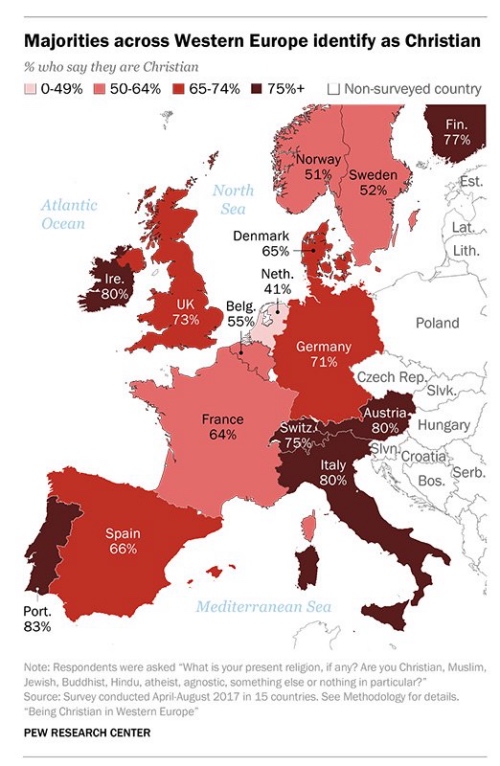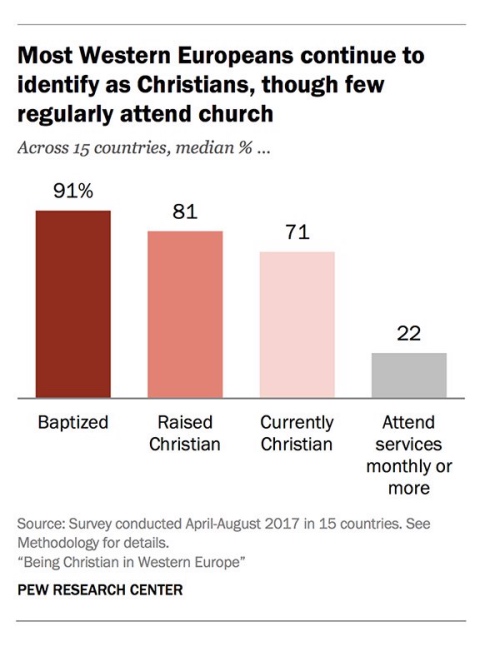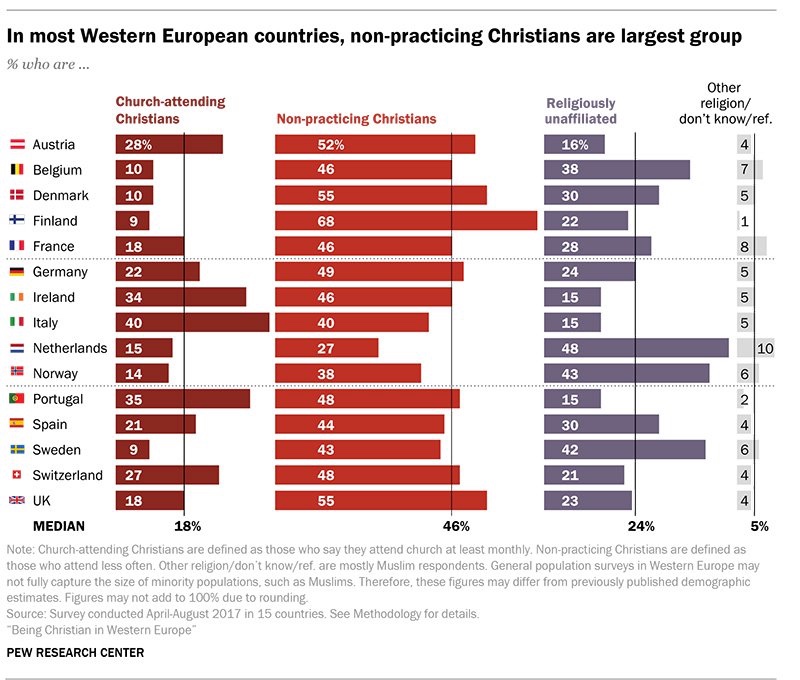
TOM HENEGAN reports on the findings of a survey looking at the state of Christianity in Western Europe…
Paris
RNS
With its dwindling rates of attendance at religious services and rising numbers of churches shuttered or sold, Western Europe seems to be the region of the world where the outlook for faith is bleakest.
Roman Catholicism’s Pope Francis was the latest to lament this trend, saying only last week that Western society seemed like “a journey ending in a shipwreck, with the survivors trying to build a raft.”

The former church Selexyz Dominicanen has been converted into a bookstore in Maastricht, Netherlands. PICTURE: Bert Kaufmann/Creative Commons
A new survey by the Pew Research Center looks past the headlines that worry the established churches to ask what Western Europeans think about religion. The results, issued Tuesday, suggest a more nuanced picture.
Despite the region’s widespread secularization, 64 per cent of the 24,599 adults Pew surveyed in 15 countries still identify as Christians, even if only 18 per cent say they attend church at least once a month.
“Christian identity remains a meaningful marker in Western Europe, even among those who seldom go to church. It is not just a ‘nominal’ identity devoid of practical importance.”
– Pew Research Center study

At 46 per cent of the total sample, non-practicing Christians make up the largest single group in the survey, almost double the 24 per cent of religiously unaffiliated – atheists, agnostics and “nones” – that often dominate commentaries about the state of Christianity in its erstwhile stronghold.
These non-practicing Christians have their own mix of religious and social views, sometimes leaning more toward their churchgoing neighbors and sometimes more toward the unaffiliated. These can have political effects as well, for example in the growing debate over Muslim immigration to Europe.
“Christian identity remains a meaningful marker in Western Europe, even among those who seldom go to church. It is not just a ‘nominal’ identity devoid of practical importance,” the survey said.
While religion surveys in Europe have long noticed this large group of nonpracticing Christians, few study them in detail.
French opinion surveys sometimes distinguish between observant and lapsed Catholics because their political views can vary, but those surveys usually don’t look closer at the respondents’ beliefs. In Germany, the usual distinction is between registered church members and nonmembers, because the system of church taxes makes this an important comparison.
Paul Bickley, head of the political program at Theos, a London thinktank that studies the role of religion, said a British census question on religion gives an idea of a group dubbed “census Christians” without further detail about beliefs.
The 2001 census showed a surprisingly large 72 per cent of self-identified Christians, but this dropped to 59 per cent in the 2011 census.
Mr Bickley agreed in general with the Pew findings but stressed the longer-term perspective that other research in Britain has indicated.
“It’s clear that religious identity and practice are both declining,” he said. “Also, the nones aren’t blanks with no spiritual beliefs at all — a lot is retained, rethought or re-understood. There’s complexity beneath any figures like these.”
In the Pew survey, about half of the nonpractitioners said they believe in a higher power or spiritual force and another quarter in the God described in the Bible, compared with two-thirds of practicing Christians who have the biblical view of God.

Some 87 per cent raise their children as Christians, not that far behind the 97 per cent of churchgoers who do so, the 168-page survey said.
About 62 per cent agree that churches and religious organisations play an important role in helping the poor, compared with 78 per cent of practicing Christians. Even among the unaffiliated, 48 percent agreed on this.
The non-practicing Christians also appeared closer to the churchgoers on social questions such as immigration and national identity, which have become hot political topics thanks to rising Muslim immigration in recent decades.
About half of all Christians – 48 per cent of the nonpracticing and 54 per cent of the observant – say their culture is superior to others. Only one-quarter of the unaffiliated agreed with that view.
Similar gaps emerged when the survey asked questions linked to immigration. Some 45 per cent of the nonpracticing Christians said Islam was not compatible with European values, against 32 per cent among the unaffiliated.
While 11 per cent of the unaffiliated would not accept a Muslim into their family and seven per cent would not welcome a Jew, 30 per cent of nonpracticing Christians would not accept a Muslim and 19 per cent would reject a Jew.
“Both church-attending and non-practicing Christians are more likely than religiously unaffiliated adults in Western Europe to voice anti-immigrant and anti-minority views,” the survey remarked.
The survey did not hazard an explanation for this but did quote French Islam expert Olivier Roy as saying that traditional organised Christianity had “faded away in favor of a cultural marker which is more and more turning into a neo-ethnic marker (‘true’ Europeans versus ‘migrants.’)”
Drilling down into the numbers, the survey found that Catholics were more likely than Protestants to have negative views of Muslims.
While geography may play some part in that since southern Europe is more heavily Catholic and the north more Protestant, the survey said the overall pattern is evident in countries with large groups from both denominations, such as Britain and Germany.

The survey stressed its results did not mean most Christians opposed Muslim immigration and pointed out that churches helped to resettle refugees.
‘It could be that holding anti-immigrant positions may lead a person to embrace Europe’s historically dominant religious identity, rather than that identifying with Europe’s historically dominant religious group leads a person to take anti-minority positions,” it said.
On social issues, around four-fifths of the nonpracticing Christians agreed with the 87 per cent of unaffiliated who support abortion and gay marriage. A majority of churchgoers also approved, but at 52 per cent and 58 per cent respectively.
The survey had some interesting comparisons between Western Europe and the United States. They have roughly similar levels both of self-identification as Christian (64 per cent for Western Europeans and 71 per cent for Americans) and of the religiously unaffiliated status (about 24 per cent).
But Americans are far more likely than West Europeans — by 53 per cent versus 11 per cent — to say that religion plays an important part in their lives.
Even the religiously unaffiliated in the US see faith as more important than their counterparts across the Atlantic, to the point where American nones sometimes emerge as more religious than Christians in several European countries when asked about belief in God, prayer and attendance at religious services, it said.
The share of nones varies considerably across Western Europe, ranging as high as 48 per cent of the adult population in the Netherlands and as low as 15 per cent in Ireland, Italy and Portugal.
The survey was conducted between April and August of last year.
It said it showed higher shares for religiously affiliated people than the widely used European Social Survey because Pew only asked respondents what if any religion they followed whereas the ESS asked first if they belonged to a faith and if so which one.





